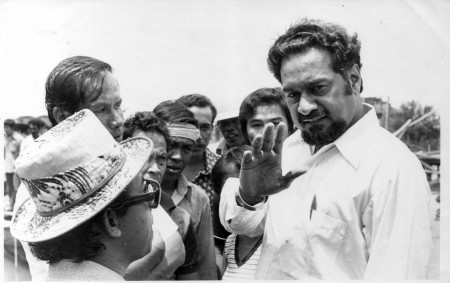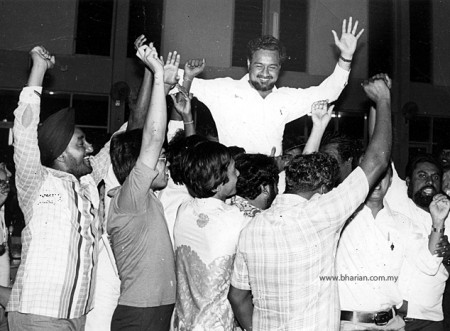For a long time, the membership of the Democratic Action Party (DAP) was drawn largely from the urban working class, which was mainly Chinese, although the party’s principles were always democratic and non-racial. Karpal Singh, a Punjabi, stood amongst them as the educated man. He learned gritty street wisdom from these people whose survival instincts more than made up for the fact that many of them did not have much by way of formal education.
Amongst them, he became a dominant and dominating figure. Already revered for many years as the Tiger of Jelutong, he once said in reference to himself that “Singh is King“. Although some said he had thus insulted the royalty by calling himself king, they could not have been serious. Even if they were serious, they could not be taken seriously. Malaysians knew exactly what Karpal meant just as they know that Elvis Presley and Pele was also King. The citizens of this country did not see arrogance in Karpal. Instead, they saw courage. They trusted him because temptation was never part of his name.
Some people say that the King had the brains of a lawyer but not that of a politician. That is probably untrue as he was an enormously successful politician, just as he was as a lawyer. More accurately, we might say that he was not, by nature, a deal-making politician. Seemingly, his legal training had hard-wired in him a preference for principles-driven and fact-based decision making.
Strong in his conviction that the people would stand by him, his firm adherence to principles as he understood them in his own old school way had on occasions stopped the party from making decisions based on pragmatism or innovation. This frustrated younger colleagues who thought that they had recently invented new and clever ways of doing things political in the face of incomplete information.
The same tiger that would leap a ravine in pursuit of principles would refuse to enter deep dark caves in which lodes of political capital were thought to exist. Instead, he stood in front of the metaphorical cave and stopped the party from entering it until he was satisfied that it understood what was in there and where it would all lead to.
It is probably true that the party lost some opportunities because the Singh was King. It is also probably true that the party was also saved from some nasty and potentially fatal bites by metaphorical snakes that lurked in such caves.
Not much of all this was planned. It was only because the Tiger was not someone whom the rest in the party would lightly take on. Meanwhile, denied the shelter of a cave, more than a few lightweights buckled and the Judases showed their true colours as the winds howled and the rains lashed. On hindsight, such situations allowed the party to sieve through who was real and who was not before it embarked on major initiatives. On more than a few occasions, taking his views into consideration helped to hold the party together and kept it on what up to now, looks like the correct path.
He was not a wily strategist. He left the fancy footwork and the artful jabs to others. To him, he would not fight if he had no case but if he had a case, he would cast an intimidating shadow on his opponent. Principles were the objectives that he fought for and his method of politics was also predicated on principles. By result, he was known for consistency and courage. These were assets in terms of electoral appeal but sometimes a liability in managing tensions within the Pakatan Rakyat coalition.
Within the party, he had much disdain for those whom he thought were trying to seek their own ascendancy in too short a time by playing politics within the party. It did not strike him as ironic that he should expect politicians to behave like diligent lawyers in a well-run law firm. He probably thought that people should pay their dues as they moved up on the respect they earned from senior colleagues and they should know that he was a senior partner. A purr for someone whom he liked, a growl for another who irritated him. Beyond that, except in dealings with one or two persons whom he regarded as his peers, one swipe of his paw or the threat of that would often settle matters in short order within the party.
Against political opponents outside the party, he was prepared to engage them ferociously into the ropes. Any weaving and ducking would have a forward momentum. There would be no undignified feigning or retreat. If he had to go to jail, as he did once and was about to do so again before he died, so be it.
For more than half a century, the DAP has played an important role in fostering competitive politics in this country, thus keeping alive the spirit of democracy, which implied a non-racial approach to politics. In the 21st century, this ultimately has to be the correct path for Malaysia. For many years, Karpal Singh’s presence was perhaps the best argument that the DAP was not and would never be a Chinese party despite the efforts of its political opponents to label it as such. Today, the array of multi-ethnic talent in the party gives it its best hopes yet of being accepted as a truly non-racial party.
Honouring the memory of Karpal Singh requires the DAP to stay on the correct path. For the DAP to make a difference, it must stand vigilant against arrogance. That A-word springs from overestimation of one’s’ strengths and underestimation of one’s weaknesses. It must also stand vigilant against temptation. That T-word lurks in the cleavage between opportunities and threats.
Karpal Singh became a successful lawyer without acing law school because he understood people and worked hard at the law. He became a successful politician because the world of politics needed him more than he needed them. He did not chase political opportunities and glory. He staked out his position and opportunities came to him. He lived courageously and offered himself in service of others.
Long may we remember him. “Over my dead body” were his famous words in one particularly well known situation. In many situations in future, may these words remind all who choose a career in politics that the politics of silence will be rejected and the politics of conviction is what this country needs. He died with an appeal against his conviction for sedition still pending. That conviction does not mar Karpal Singh’s record as a human being or as a citizen of Malaysia. It is a stark reminder to all of us that the work of nation-building is very much still a work-in-progress.
The people of Malaysia in all our multi-ethnicity are now in mourning as we grief the passing of Karpal Singh. Our hearts go out to his wife and children and their families. Amidst the grief, there is a dignified calm all around us. See how the sun shines on us even as we say good-bye to him.
The author is not a member of any political party. He resides in Ipoh. He can be contacted at haroldkong.sophia@gmail.com.
 Facebook
Facebook  Twitter
Twitter  Soundcloud
Soundcloud  Youtube
Youtube  Rss
Rss 
